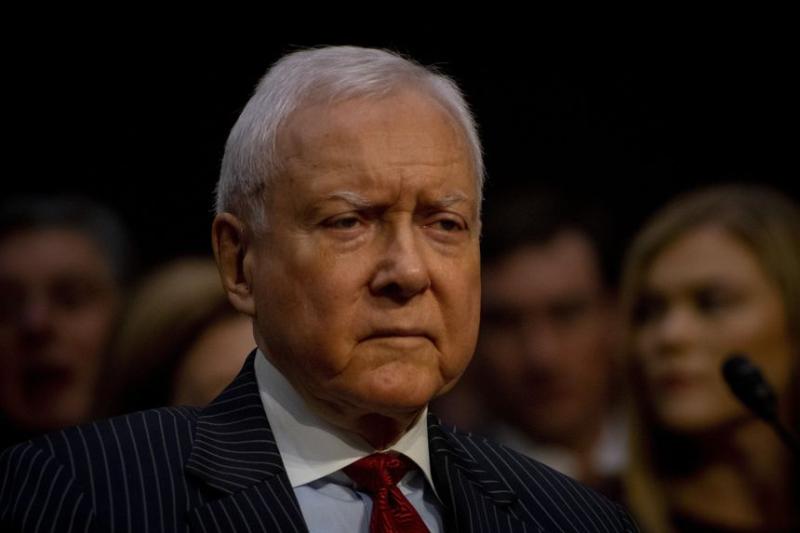Orrin Hatch, Longest-Serving Republican U.S. Senator, Dies at 88 - WSJ
By: Richard Rubin and Eliza Collins (WSJ)



WASHINGTON—Former Republican Sen. Orrin Hatch, who played a pivotal role in major tax, civil-rights and healthcare legislation over more than four decades, died on Saturday, his foundation said. He was 88 years old.
Mr. Hatch represented Utah in the Senate from 1977 to 2019. He was the country's longest-tenured Republican senator. According to his foundation, he spent 32 of his 42 years in Congress as either the chairman or the top Republican on a committee.
Mr. Hatch announced his retirement in 2018, soon after shepherding through Congress a $1.5 trillion tax cut that then-President Donald Trump signed into law.
Mr. Hatch had worked on a bipartisan basis with the late Sen. Ted Kennedy, a Democrat, to co-write the Children’s Health Insurance Program , or CHIP, which expanded health coverage for poor children. He worked with senators of both parties to pass the Americans With Disabilities Act , which he later called a top achievement of this career.
“Most of the pieces of legislation I am most proud of had dozens of co-sponsors, were widely seen as bipartisan, and have remained on the books largely because I did not get everything I wanted,” Mr. Hatch said in a 2018 speech as he was preparing to leave the Senate. “Our differences may be as innumerable as our similarities. But, if we start with the premise that every member’s intent is to improve our country and the life of its citizens, then our disagreements are logistical, not personal.”
Mr. Hatch helped shape the Supreme Court from the Judiciary Committee, championing the nomination of Justice Clarence Thomas and participating in more than a dozen high-court confirmation hearings, as Republicans looked to point the court in a more conservative direction. He later recommended the late liberal Justice Ruth Bader Ginsburg to then-President Bill Clinton, a Democrat, for the court and described her as a dear friend despite different ideological views.
During his final term, Mr. Hatch was chairman of the Senate Finance Committee, with jurisdiction over tax, trade and health policy. His largest achievement during that period was the 2017 tax law , and befitting an increasingly partisan era in Congress, it didn’t have the bipartisan flavor of some of his earlier legislation. He was succeeded in the Senate by Republican Mitt Romney.
Late Saturday, Senate Minority Leader Mitch McConnell (R., Ky.), who served alongside Mr. Hatch for decades, called him a principled conservative on taxes and the judiciary who was “just as eager and effective a quarterback” on bipartisan issues such as the ADA. Mr. Romney praised Mr. Hatch’s legislative achievements and said “few men have made their mark on the Senate as he did.”
While House Republicans spent much of early 2017 publicly debating their own plans, Mr. Hatch and his staff more quietly put together core pieces of what became the Tax Cuts and Jobs Act. Among his priorities: lowering marginal tax rates, revamping the international tax system and repealing the individual mandate tax for not purchasing health insurance.
Mr. Hatch delegated key roles to more-junior lawmakers, who ironed out the details. Together they forged the intra-Republican compromise that passed the Senate .
Mr. Hatch was an accomplished songwriter and composer, writing more than 300 songs, including one played at George W. Bush’s inauguration. Most of the songs were religious in nature. The song “Unspoken,” which he co-wrote, was included in a compilation of Christian pop music and sold more than one million copies, earning Mr. Hatch a gold and platinum album. One of the last pieces of legislation he pushed for was a bill to overhaul the laws related to how songwriters are paid when their songs are licensed or played.
His foundation said he died Saturday afternoon in Salt Lake City surrounded by family.
He was married to his wife, Elaine, for more than 60 years. They had six children and dozens of grandchildren and great-grandchildren.
He won election to the Senate in 1976, beating incumbent Frank Moss, and faced few serious challenges after that in a state that has become reliably Republican. He campaigned as a political newcomer and attacked Mr. Moss for serving in the Senate too long, though he would go on to set records for his lengthy time in office.
A tall, thin man with a wry sense of humor, Mr. Hatch was comfortable in the clubby Senate, at ease with Democrats and Republicans alike. He could work closely with Mr. Kennedy on health policy, finding common ground with his ideological opposite. And the former amateur boxer could be a political fighter, too, particularly in judicial confirmation debates stretching from Robert Bork to Brett Kavanaugh.
He tried to capitalize on his legislative record in a bid for the 2000 Republican presidential nomination, but that campaign failed to gain traction and he dropped out after finishing last in the Iowa caucuses.
Mr. Hatch started his Senate career as one of the more conservative Republicans, aligned with Ronald Reagan in a more ideologically diverse party. Over time, he found himself at the party’s center, joining the Republican leadership on broadly supported legislation but rejecting many Democratic initiatives. He was a generally reliable vote for business interests, particularly the technology sector and Utah’s nutritional-supplement industry.
He supported the 2008 rescue of the financial system, but opposed the core proposals in President Barack Obama’s first term, including economic-stimulus legislation and the healthcare overhaul.

Tags
Who is online
60 visitors


On some of the most important issues of his time, he made a difference.
Well done Sir.
He was great most of the time he was in the senate.